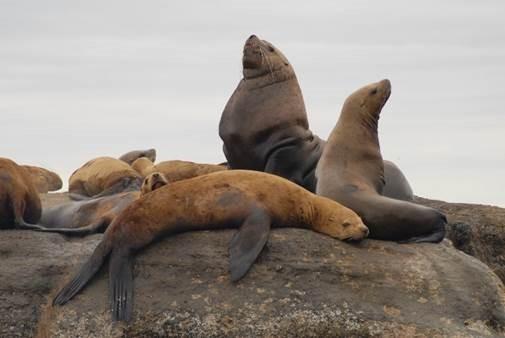There is an increase in the number of stranded California sea lions along the entire Oregon coast due to leptospirosis, a naturally-occurring bacteria that can also sicken dogs, people, other wildlife, and livestock.
Dogs are most at risk of getting the disease while the risk to people is small. Dog and horse owners should discuss the merits of vaccination for leptospirosis with their veterinarian. Oregon Department of Fish and Wildlife and Oregon Parks and Recreation urge beachgoers to leash their dogs and keep at least 150 feet away from live or dead sea lions.
The disease can spread when an animal or person is in contact with urine or other bodily fluids of an infected or dead sea lion.
Leptospirosis outbreaks occur sporadically in marine mammals. Outbreaks can result in increased strandings and mortalities among sea lions. The Oregon Marine Mammal Stranding Network documented over 150 sick or dead sea lions along the Oregon coast since the current outbreak began in late July 2022. Necropsies on seven sea lions confirmed all tested positive for leptospirosis.
Sick or injured seals, sea lions, whales or dolphins can be reported to OSP at 1-800-452-7888.
In sea lions, clinical signs of leptospirosis include dehydration, increased drinking or urinating, vomiting, depression and a reluctance to use the hind flippers.
Depending on the strain of the bacteria, clinical signs are usually the result of dysfunction of the kidneys and/or liver. Symptoms are similar in dogs and other mammals.
According to the Center for Disease Control, in people, symptoms of leptospirosis include high fever, severe headache, chills, muscle aches, and vomiting, and may include jaundice (yellow skin and eyes), red eyes, abdominal pain, diarrhea, or a rash. If the disease is not treated, the patient could develop kidney damage, meningitis (inflammation of the membrane around the brain and spinal cord), liver failure, and respiratory distress. In rare cases, death occurs.
Leptospirosis is periodically detected in California sea lions along the California and Oregon coast, usually every 2-4 years. It results in increased strandings and mortalities among sea lions.
Young male sea lions in the fall appear to be the most susceptible to the disease. Other marine mammals that can be infected by the disease include the northern fur seal, elephant seal, and Pacific harbor seal.
All marine mammals are protected by the Marine Mammal Protection Act, and it is a violation of federal and state laws to harasses, touch, or feed marine mammals. Marine mammals on the beach are often just resting or are sick and should be left alone.

